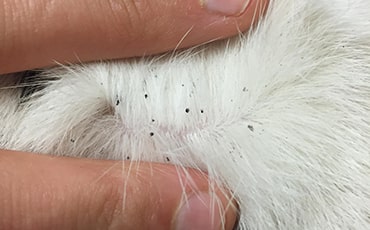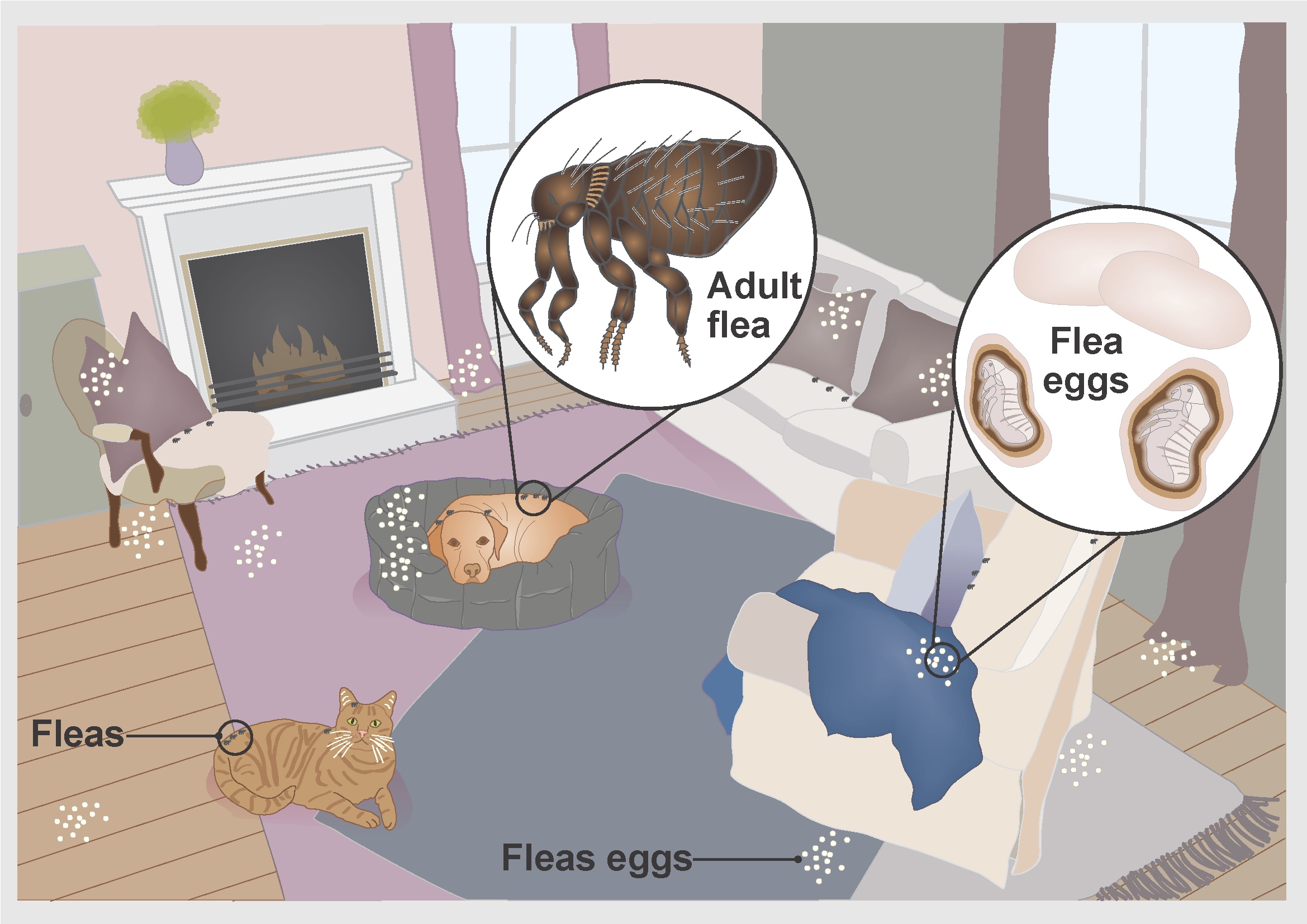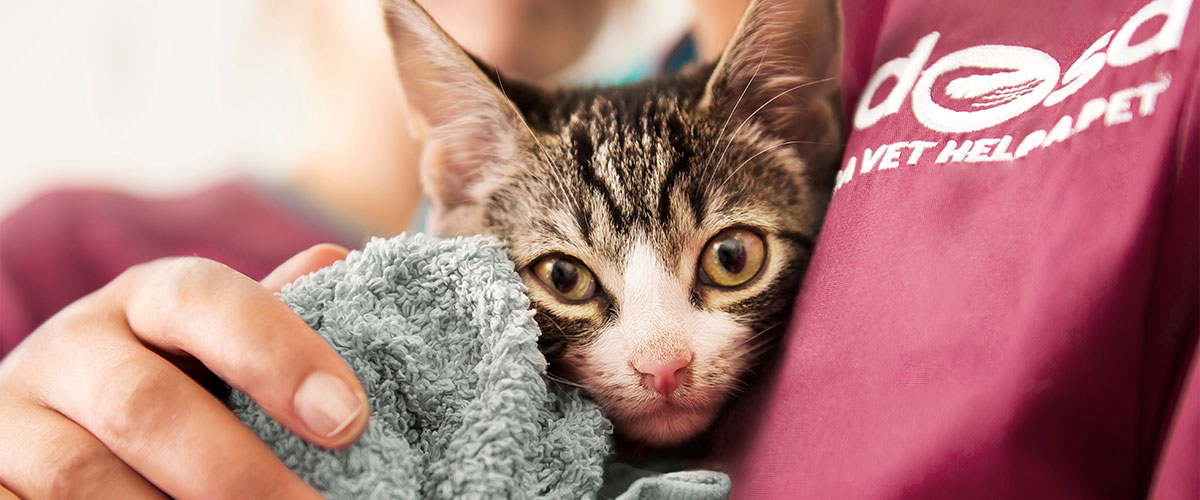Fleas on cats
Overview
- Fleas are a common problem that most pet owners have to deal with at some point.
- As well as being extremely irritating, fleas can lead to skin problems, allergic skin disease and in some cases serious conditions such as anaemia (blood loss).
- 95% of a flea problem lives in the home – if your cat has fleas, your home does too!
- Prevent fleas by regularly treating your pets (and home) with a licensed flea product.
General information
Fleas are tiny insects that bite and cause itchy skin. They can lead to skin problems, especially in cats with flea allergies, and can even cause anaemia (blood loss) in kittens. Fleas are most common during the summer months and can be caught from other animals, the outdoors, or from your home (if they’ve been brought in on shoes or clothes).
How to tell if your cat has fleas
Not all cats with fleas have symptoms, but you may notice the following:
- Scratching
- Alopecia (bald patches) or rough/spikey fur
- Sore, infected skin
- Bites or a rash
- Flea dirt (often on the lower back)
- Enjoying scratches more than usual because they are so itchy
- Nibbling their back end
- Live fleas (uncommon because they aren't easy to see)

Flea dirt in fur
When to contact your vet
If you think your cat has fleas, call your vet practice for advice. If they have had a vet check recently, it’s likely you’ll be able to collect a flea product without them being seen, but if they haven’t been examined in a while, or have developed skin problems due to fleas, they will need an appointment.
How to get rid of fleas
To treat fleas you need to:
Treat your cat - treat your cat and any other cats, dogs and rabbits in the house (on the same day). Ideally use a prescription product from your vets, but if this isn’t possible, use an NFA-VPS product. Products you can buy of the shelf, without a prescription (e.g. from a supermarket or pet shop) often contain less effective ingredients
Treat your home - 95% of a flea infestation is in the home, this means that if your cat has fifty fleas on them, your home is likely to have up to one thousand fleas and eggs - and they can survive for up to a year! You can buy household flea spray from your vets or online.
WARNING: Never put a dog flea treatment or a household flea spray on a cat. They often contain ‘permethrin', which is extremely poisonous to cats (as well as fish and birds). Contact your vet immediately if your cat has come into contact with a dog flea treatment, or household flea spray.
Other necessary treatment. Fleas can transmit worms, so your cat should be wormed at the same time as being treated for fleas. They may also need treatment for their skin if they have developed sores/irritation.

Most of a flea problem is in the home, 50 fleas living on your cat = 1000 fleas in the home
Which flea treatment?
There are three types of flea treatment available:
1. Prescription flea treatments - proven and effective products that can only be prescribed by a vet.
2. Non-prescription off the shelf treatments - these can be bought ‘off the shelf’ without a prescription from supermarkets and pet shops. They tend to contain non-proven/less effective ingredients than prescription and NFA-VPS products.
3. Non-prescription NFA-VPS treatments - these can be bought without a prescription, but are only available from locked cupboards in pharmacies, vet clinics and pet shops. NFA-VPS products tend to be more effective than ‘off the shelf’ products. You will need to know your cat’s weight to buy one.
Preventing fleas
It can take a few weeks to sort out a flea problem, but once they’ve gone it's easy stop them coming back:
- De-flea all of your cats, dogs and rabbits as regularly as your vet recommends (depends on which flea product you’re using).
- De-flea your home once a year.
- Keep your home clean by vacuuming regularly.
- Keep pet bedding clean by washing it at 60°C.
- Only allow flea-free cats, dogs and rabbits into your home.
- Regularly check your pets for flea dirt, particularly around their back end and above the base of their tail.
Can humans catch fleas?
Fleas can’t live on humans, but can bite us. If your pets have fleas, your home will too and you may notice itchy bite marks around your ankles or on your arms. Contact your pharmacist, doctor or the NHS if you have skin irritation that’s worrying you.
What if I can’t get hold of a flea treatment for my cat?
If you are unable to get a prescription flea treatment from your veterinary practice, you may need to consider temporarily using a non-prescription product (from a pet shop, or online). If your pet has a condition that requires prescription flea treatment, it's important to contact your vet to discuss your options.
Published: July 2020
Did you find this page useful?
Tell us more
Please note, our vets and nurses are unable to respond to questions via this form. If you are concerned about your pet’s health, please contact your vet directly.
Thank you for your feedback
Want to hear more about PDSA and get pet care tips from our vet experts?
Sign up to our e-newsletter
Written by vets and vet nurses. This advice is for UK pets only. Illustrations by Samantha Elmhurst.

 Video found at youtu.be/GcNfBCfgX4E
Video found at youtu.be/GcNfBCfgX4E
